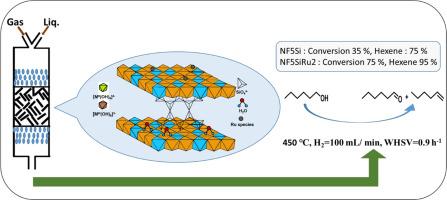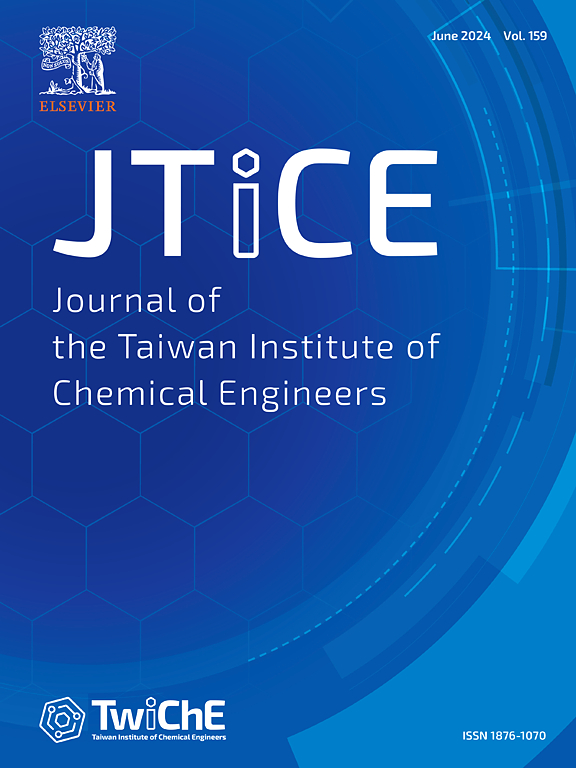镍-铁基硅酸盐叠层氢铝酸盐:转化己醇的潜在催化剂
IF 5.5
3区 工程技术
Q1 ENGINEERING, CHEMICAL
Journal of the Taiwan Institute of Chemical Engineers
Pub Date : 2024-09-27
DOI:10.1016/j.jtice.2024.105775
引用次数: 0
摘要
背景生物质衍生平台分子的脱氧是生产生物燃料的必要过程。可再生资源(即生物醇)可将醇转化为醚、醛和烯,从而提高生物质成分的价值。方法 采用简单的共沉淀法制备了基于 Ni-Fe 和硅酸盐夹杂 Ni-Fe 水滑石 (HT) 的催化剂。研究结果 从粉末 X 射线衍射 (XRD) 反射中可以明显看出层状 HT 结构。TEM 和 XPS 分析证实,硅酸盐阴离子的引入以及随后钌在 HT 上的负载促进了 Ru 在 HT 表面的均匀分散。使用含有 2% 钌的硅酸盐插层 NiFe-HT(NF5SiRu-2C)催化剂,观察到 63% 的己醇转化率,并且在 24 小时后其催化活性保持不变。本文章由计算机程序翻译,如有差异,请以英文原文为准。

Ni–Fe-based silicate-intercalated hydrotalcite: A potential catalyst for hexanol conversion
Background
The de-oxygenation of biomass-derived platform molecules is a necessary process to produce biofuel. Renewable resources, viz., bio-alcohol, can convert alcohol into ethers, aldehydes, and alkenes, thereby increasing the value of the biomass components. In this regard, mixed metal oxides derived from hydrotalcite materials have multi-functional (acid-base-redox) properties and are promising for such organic transformations.
Methods
Ni–Fe and silicate-intercalated Ni–Fe hydrotalcite (HT)-based catalysts were prepared using a simple co-precipitation method. The materials were thoroughly characterized and investigated for hexanol conversion in vapor phase conditions.
Findings
A layered HT structure was evident from the powder X-ray diffraction (XRD) reflections. TEM and XPS analysis confirmed that the introduction of silicate anions and subsequent loading of ruthenium on HT facilitate the uniform dispersion of Ru on the HT surface. Using the silicate intercalated NiFe-HT (NF5SiRu-2C) catalyst with 2% ruthenium, a 63% hexanol conversion was observed and its catalytic activity remained the same after 24 h.
求助全文
通过发布文献求助,成功后即可免费获取论文全文。
去求助
来源期刊
CiteScore
9.10
自引率
14.00%
发文量
362
审稿时长
35 days
期刊介绍:
Journal of the Taiwan Institute of Chemical Engineers (formerly known as Journal of the Chinese Institute of Chemical Engineers) publishes original works, from fundamental principles to practical applications, in the broad field of chemical engineering with special focus on three aspects: Chemical and Biomolecular Science and Technology, Energy and Environmental Science and Technology, and Materials Science and Technology. Authors should choose for their manuscript an appropriate aspect section and a few related classifications when submitting to the journal online.

 求助内容:
求助内容: 应助结果提醒方式:
应助结果提醒方式:


